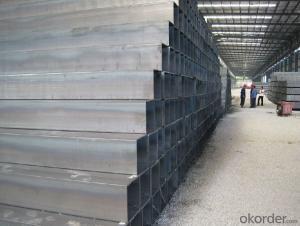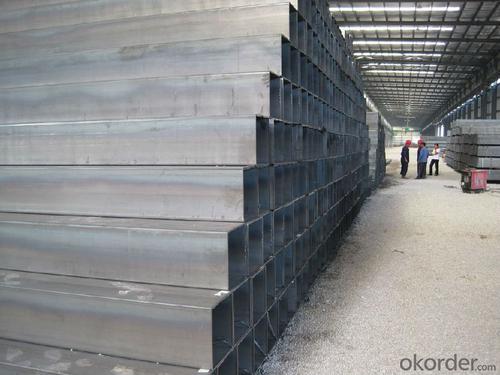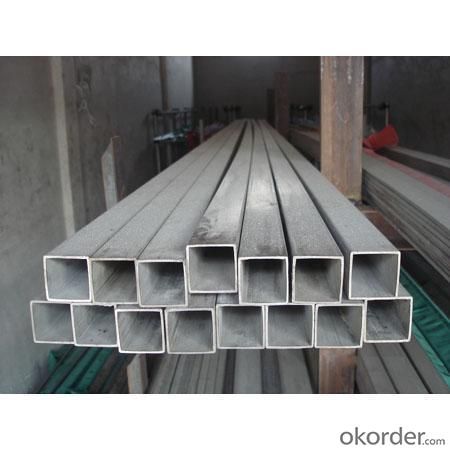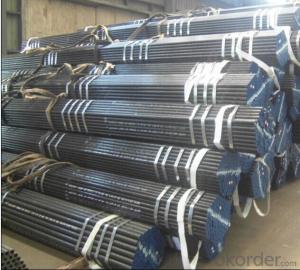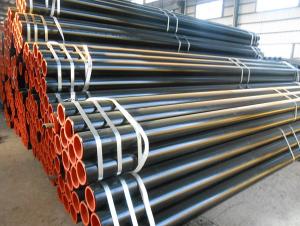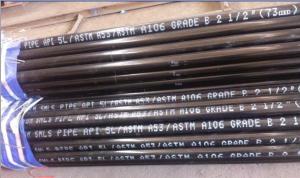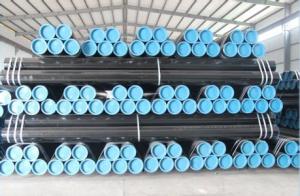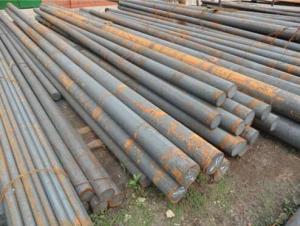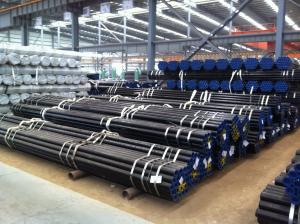Carbon Steel Seamless Steel Pipe API 5L High Quality
- Loading Port:
- Tianjin
- Payment Terms:
- TT or LC
- Min Order Qty:
- 25 m.t.
- Supply Capability:
- 10000 m.t./month
OKorder Service Pledge
OKorder Financial Service
You Might Also Like
Product Description:
1、Structure of Square Tube Description:
The square tubes are used in structural projects, shelves, racks, trailers and in ornamental purpose. The framework made by square steel tubes, is used for providing support to the roof. This framework is also used as roof top ventilation baffles. With compare to round steel tubes, square steel tubes are little more efficient. The reason is that the square column is more efficient than the solid circular column.
2、Main Features of the Square Tube:
high quality and low peice
quick delievry
in stock
produced by own factory
authentication:CANS CNAB IAF PAC CEC
3、Square Tube Images:
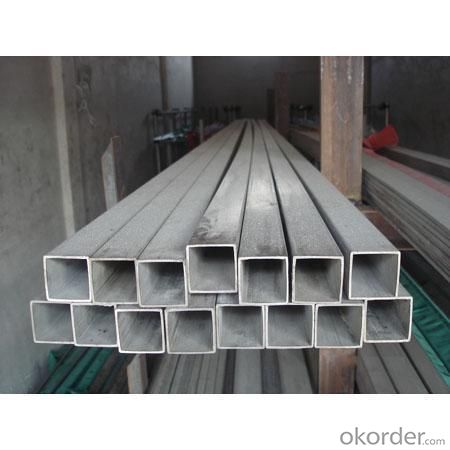
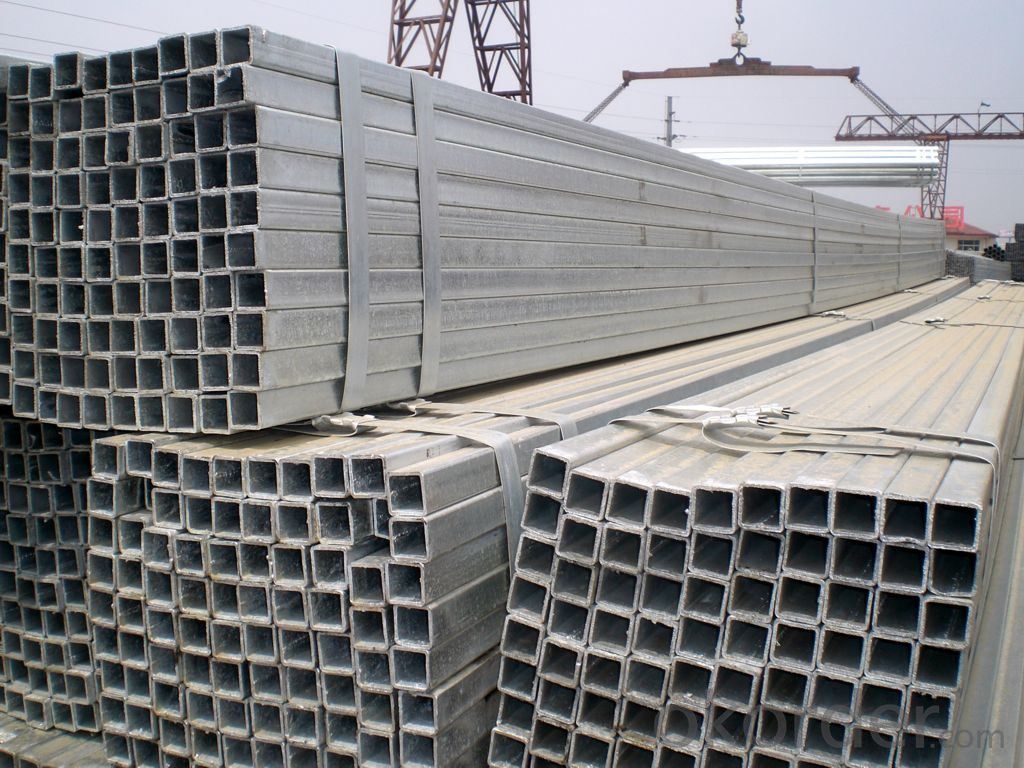
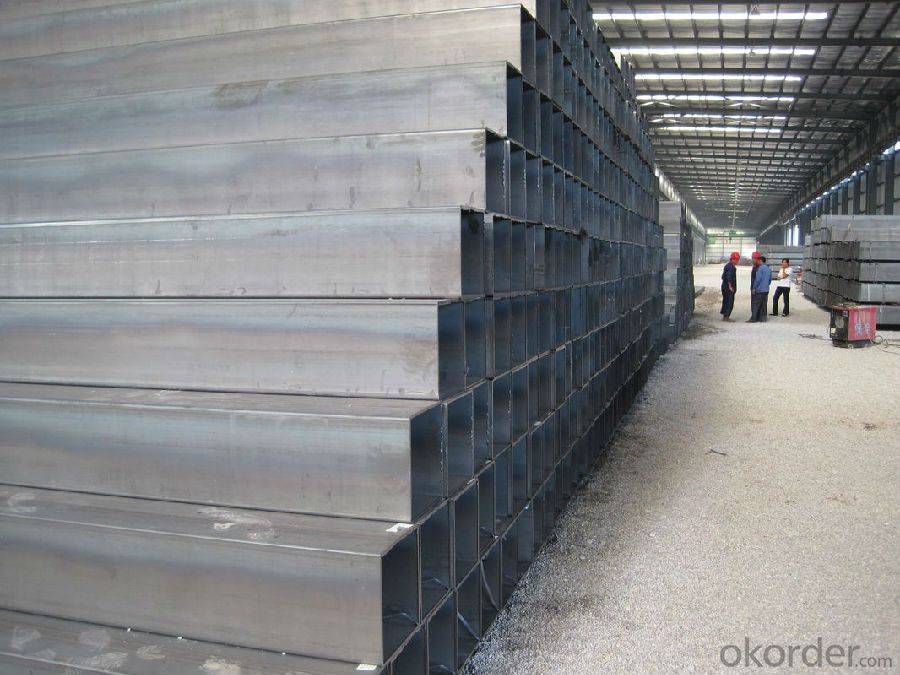
Packaging & Delivery
| Packaging Details | In Bundles, Varnish coating, Ends can be bevelled or square cut, End capped. |
| Delivery Details | 10 days |
4、Square Tube Specification:
Standard JIS, GB, DIN, ASTM
JIS G3445-2006, JIS G3444-2006, JIS G3446-2004, JIS G3441, GB/T 8163-1999, GB/T 8162-1999, DIN EN 10216-1-2004, DIN EN 10217-1-2005, DIN EN 10305, ASTM A106-2006, ASTM A53-2007, ASTM A789-2001, ANSI A213-2001, ASTM A179-1990Grade 10#-45#, Cr-Mo alloy, Mo, Q195-Q345, CrNi alloy
10#, 20#, 45#, 15CrMo, 12CrMo, 13CrMo44, 12CrMo195, 16Mo, 16mo3, Q235, Q345, Q195, Q215, Cr17Ni8, 1Cr13Mn9Ni1NThickness 1-50mm Outer Diameter 15*15---80*80 Technique Hot Rolled Certification API Surface Treatment Copper Coated Alloy Or Not Non-alloy
standard: ASTM JIS DIN GB
size: O.D: 10*10——50*50 mm
W.T: 1-50 mm
length: 6-12m or as request
packing: paint,bundles or for the clients’ needs
5、FAQ of Square Tube:
①How is the quality of your products?
Our products are manufactured strictly according to national and internaional standard, and we take a test
on every pipe before delivered out. If you want see our quality certifications and all kinds of testing report, please just ask us for it.
Guaranteed: If products’ quality don’t accord to discription as we give or the promise before you place order, we promise 100% refund.
②How about price?
Yes, we are factory and be able to give you lowest price below market one, and we have a policy that “ for saving time and absolutely honest business attitude, we quote as lowest as possible for any customer, and discount can be given according to quantity”,if you like bargain and factory price is not low enough as you think, just don’t waste your time.Please trust the quotation we would give you, it is professional one.
③Why should you chose us?
Chose happens because of quality, then price, We can give you both.Additionally, we can also offer professional products inquiry, products knowledge train(for agents), smooth goods delivery, exellent customer solution proposals.Our service formula: good quality+good price+good service=customer’s trust
SGS test is available, customer inspection before shipping is welcome, third party inspection is no problem.
- Q: What is the role of steel pipes in the food processing industry?
- Steel pipes play a crucial role in the food processing industry by providing a reliable and hygienic means of transporting various fluids, such as water, gases, and food products. These pipes are resistant to corrosion and can withstand high temperatures and pressures, ensuring the safety and efficiency of food processing operations. They are used for conveying ingredients, cleaning agents, steam, and other necessary fluids, maintaining the integrity and quality of food products throughout the manufacturing process.
- Q: What is the difference between steel pipes and plastic pipes?
- The main difference between steel pipes and plastic pipes lies in their material composition. Steel pipes are made from a durable and strong metal alloy, while plastic pipes are composed of various types of plastic polymers. This difference in materials leads to variations in their properties and usage. Steel pipes are known for their high strength, resistance to extreme temperatures and pressures, and longevity, making them suitable for applications requiring robustness, such as in industrial settings or underground pipelines. On the other hand, plastic pipes are lightweight, flexible, and corrosion-resistant, making them ideal for plumbing, irrigation, and other non-industrial applications. Additionally, plastic pipes are easier to install and handle due to their lighter weight and flexibility compared to steel pipes.
- Q: What does "1.5" steel tube mean?
- This is neither an outer diameter nor an inner diameter; it should be related to an English unit at the beginning of the pipeline development; it is usually used to describe galvanized steel pipes; it corresponds to the English units as follows:4, in charge of: 4/8 inches: DN15;? 6 in charge: 6/8 inches: DN20;? 1 inch tube: 1 inches: DN25;? inch two tubes: 1 and 1/4 inches: DN32;? inch half tube: 1 and 1/2 inches: DN40;- inch tube: 2 inches: DN50;? three inch tube: 3 inches: DN80? four inch tube: 4 inches: DN100;
- Q: Can steel pipes be used for conveying sewage sludge?
- Indeed, sewage sludge can be conveyed using steel pipes. Steel pipes possess several properties that render them suitable for this purpose. Firstly, their strength and durability enable them to endure the pressure and weight of sewage sludge without collapsing or fracturing. This is of utmost importance as sewage sludge can be quite heavy and may contain solids that could exert stress on the pipes. Secondly, steel pipes exhibit resistance to corrosion, which is crucial when conveying sewage sludge that frequently contains corrosive components. By utilizing corrosion-resistant steel pipes, one can ensure a prolonged lifespan and minimize the risk of leaks or damage. Moreover, steel pipes can be manufactured in various sizes and diameters, granting flexibility in the design of sewage systems to meet specific requirements. Nonetheless, it is vital to emphasize the necessity of proper maintenance and regular cleaning to prevent sludge buildup and maintain the pipes' efficiency.
- Q: What are the different types of steel pipe fittings for plumbing systems?
- There are several types of steel pipe fittings commonly used in plumbing systems, including elbows, tees, couplings, unions, caps, and plugs. Each of these fittings serves a specific purpose in connecting and directing the flow of water or other fluids within the plumbing system.
- Q: How are steel pipes used in the construction of water supply systems?
- Steel pipes are commonly used in the construction of water supply systems due to their durability, strength, and resistance to corrosion. These pipes are used to transport water from the source to various points of distribution, such as buildings, homes, and industries. Steel pipes are often buried underground or installed above ground, depending on the specific requirements of the project. Additionally, steel pipes can withstand high pressure and are suitable for carrying large volumes of water, making them a reliable choice for water supply systems.
- Q: Can steel pipes be used for water supply networks?
- Yes, steel pipes can be used for water supply networks. They are commonly used due to their durability, strength, and resistance to corrosion. However, proper coatings and maintenance are necessary to prevent rusting and ensure the quality of the water supply.
- Q: How do you calculate the thermal expansion of steel pipes?
- To calculate the thermal expansion of steel pipes, you need to know the coefficient of thermal expansion (CTE) of the specific type of steel used. This value represents how much the steel material expands or contracts per unit length with each degree of temperature change. Once you have the CTE, you can multiply it by the initial length of the steel pipe and the temperature change to determine the thermal expansion. The formula is: Thermal Expansion = CTE x Initial Length x Temperature Change.
- Q: Can steel pipes be used for sewage systems?
- Yes, steel pipes can be used for sewage systems. Steel pipes are commonly used in sewage systems due to their durability, strength, and resistance to corrosion. They are particularly suitable for high-pressure applications and can withstand the harsh conditions often found in sewage systems. Additionally, steel pipes are relatively easy to install and maintain, making them a popular choice for sewage infrastructure projects.
- Q: Are steel pipes suitable for potable water systems?
- Indeed, steel pipes prove to be an appropriate choice for potable water systems. Due to their robustness, longevity, and ability to resist corrosion, they are frequently employed in such systems. These pipes can endure substantial pressure and transport significant quantities of water. Furthermore, their versatility is evident as they can be effortlessly welded together, rendering them suitable for a wide range of applications within potable water systems. Nevertheless, it is crucial to emphasize the importance of regular inspections and adequate maintenance to avert potential problems such as rust or contamination.
Send your message to us
Carbon Steel Seamless Steel Pipe API 5L High Quality
- Loading Port:
- Tianjin
- Payment Terms:
- TT or LC
- Min Order Qty:
- 25 m.t.
- Supply Capability:
- 10000 m.t./month
OKorder Service Pledge
OKorder Financial Service
Similar products
Hot products
Hot Searches
Related keywords
